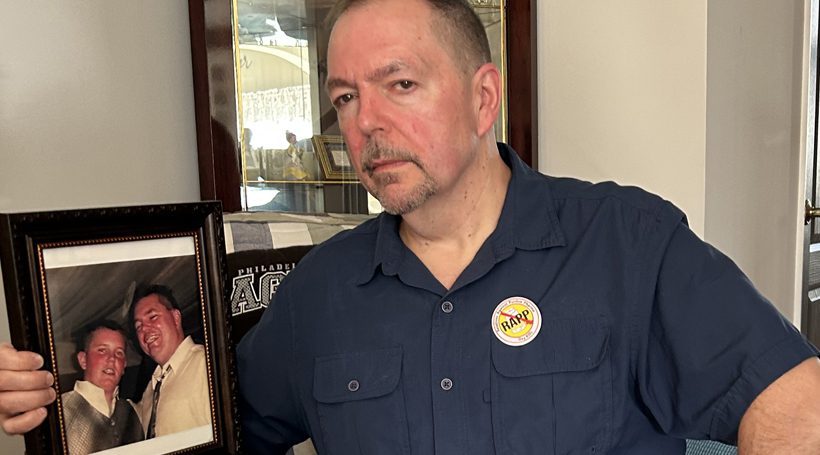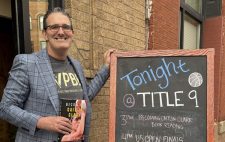It would be hard to find anyone these days who has not heard of OxyContin or the devastating and deadly effects of the opioid crisis over the past 2 decades.
But in February 2001, Westampton resident Ed Bisch was blindsided when his 18-year-old son Eddie was found unresponsive in his bed.
Eddie’s younger sister Christi discovered him there, her brother’s skin already turning a shade of blue. She called 911 first and then her father, who raced to the house from work. When Bisch arrived a few minutes later, he saw paramedics and felt short-lived relief. “I’m sorry,” said one of the EMTs. It was too late to save Eddie, and Bisch’s life changed in an instant.
Police on the scene told Bisch that local kids were dying from “Oxy” and the situation was getting worse. The drug, they said, was spreading quickly across the country and already causing chaos locally.
“I just cried,” Bisch says, the long-ago anguish still apparent in his voice. “I couldn’t believe it. How could I never have heard of this? I watched the news and read the paper every day. I said, ‘Oh my God. We’ve got to warn the kids.’”
Bisch has been sounding alarms about the dangers of opioids now for more than 2 decades. As the founder of Relatives Against Purdue Pharma (RAPP), he attended countless public hearings, trials and protests and is a claimant in a class-action lawsuit against the pharmaceutical company, creators of Oxy.
Bisch’s activism got him noticed by others fighting against opioid abuse, including Beth Macy, author of “Dopesick: Dealers, Doctors, and the Drug Company that Addicted America.” Macy wrote about Bisch in her latest book, “Raising Lazarus: Hope, Justice, and the Future of America’s Overdose Crisis.”
“I met Ed when starting Dopesick in 2016,” says Macy, who was looking for everyday people whose personal stories fueled their extreme commitment to the cause. “When I talked to activists, they all said, ‘You’ve got to call Ed!’ We’ve probably spoken 200 times.”
He’s proud that his character in the Hulu series adaptation of Dopesick (which for its star, actor Michael Keaton, won an Emmy) is shown holding an actual framed photo of Eddie during a protest scene.
Bisch relishes opportunities to talk about his son and the close relationship they had. Beyond the typical father/son bond, they enjoyed spending time together, often going fishing or just hanging out. “He was a normal kid,” says Bisch, who was 37 when his son died. Eddie would have turned 40 this year.
When Bisch created a simple website, a one-page site telling Eddie’s story, it organically evolved into a memorial for the many (mostly) young people who had died from the drug. At first, Bisch got only supportive emails urging him to keep up the good work, but then the messages were mixed.
“What surprised me was that I got so many emails from people who were upset with me because they had been prescribed OxyContin for pain and it was helping them,” says Bisch. He also received messages from patients who took it as directed, then became addicted – or from family members who described their loved one’s addiction.
Bisch also heard from executives at Purdue Pharma asking him to take down the site. The company cited “wild media stories” and said websites like his were preventing people suffering from pain from getting help they needed. “They claimed sales were down. I was just learning, and I had no reason not to believe them,” says Bisch who changed the name to oxyabusekills.com. (The site is no longer active.)
Later when he learned the drug company’s sales had actually increased, he was angry, and it prompted him to change his focus.
“I went from just warning kids about using OxyContin to making sure people know that this company’s denials are all false,” Bisch says.
The website work gradually ended, but Bisch’s activism continued, and around 2003, he and 3 moms who also lost children to opioids formed a protest movement. Joined by others who were also fueled by personal tragedies, the group was known for holding up photos of their dead children at high-profile protests.
In 2010 Bisch joined a massive class-action lawsuit against Purdue Pharma and its owners, the Sackler family. Last year, the Sackler family agreed to pay up to $6 billion to resolve widespread litigation alleging they had fueled the U.S. opioid epidemic. While the suit continues to wind its way through the court system, Bisch still protests, attends hearings and continues to raise awareness whenever possible.
“What drives me is that the fines these big companies get – even billions of dollars – are just a fraction of what they’ve made. Without real punishment as a deterrent, this will happen again,” he says. “I’ve gotten so many messages thanking me, and without this work, even with all these deaths, it would be even worse.”
“We need the 3Rs – supply reduction, demand reduction and harm reduction,” Bisch adds. He says all 3 are needed to slow the supply, to slow the deaths and keep people alive until they’re willing to get help. “Everyone knows someone affected by this epidemic.”














